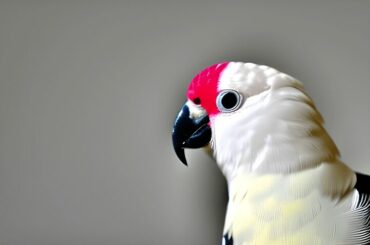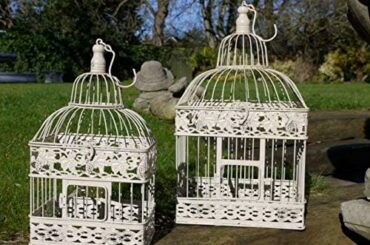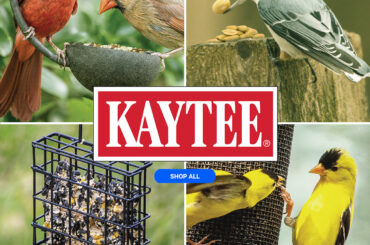Table of Contents
Introduction
Jenday Conures, also known as Aratinga jandaya, are vibrant and captivating birds that have become increasingly popular as pets. With their stunning feather colors and charming personalities, these playful birds bring a touch of the wild into your home.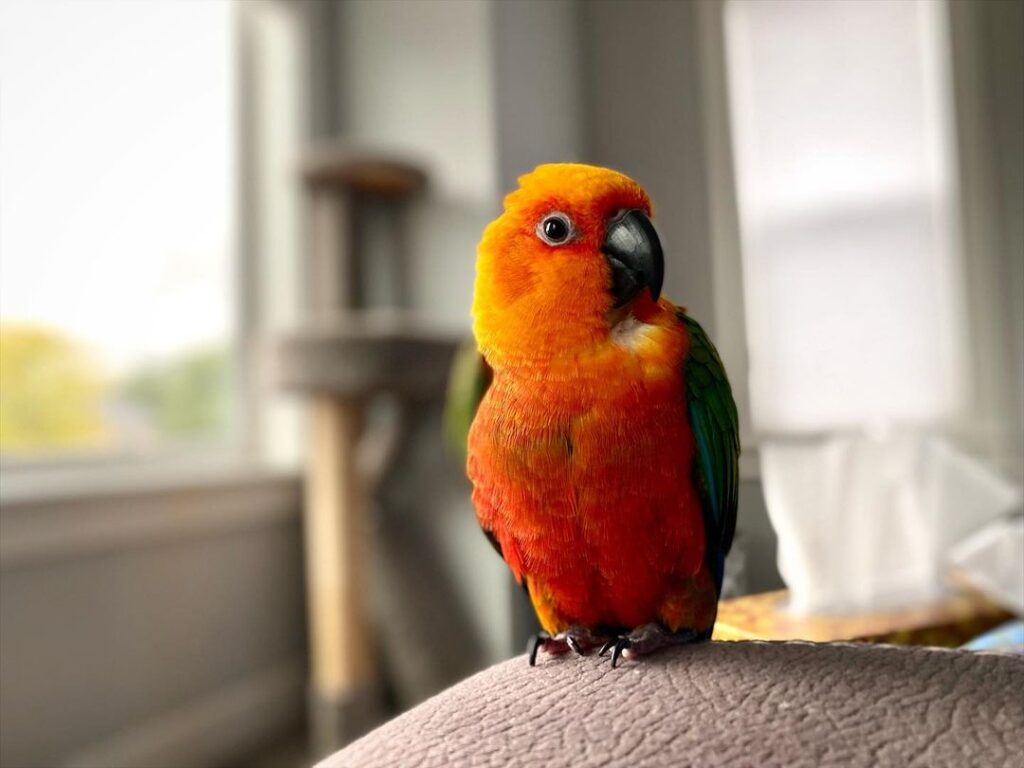
Physical Description and Characteristics of Jenday Conure Species Profile
- Vivid feather colors and patterns: Jenday Conures are renowned for their splendid plumage, boasting a captivating blend of bright red, yellow, green, and orange hues. Their feathers are adorned with eye-catching patterns, including vibrant splashes and striking streaks. It is truly a sight to behold.
- Size and shape of Jenday Conures: These small to medium-sized parrots typically measure around 12 to 14 inches in length from head to tail. They possess a sturdy build with an elongated body and an elegant tail, which adds to their overall charm and grace.
- Unique facial features: Jenday Conures possess distinct facial characteristics that make them easily recognizable. With their sleek beaks, expressive eyes, and a crown of feathers on their heads, these birds possess an irresistible charm that captivates anyone who encounters them.
Habitat and Natural Distribution
- Native habitat of Jenday Conures: This Bird Species are native to the regions of northeastern Brazil, specifically the Amazon basin. They are primarily found in dense forests and woodlands, where they can find ample sources of food and shelter.
- Geographic range in the wild: In their natural habitat, This Bird Species can be observed across various states in northeastern Brazil, including Piauí, Maranhão, and Bahia.
Behaviors and Temperament 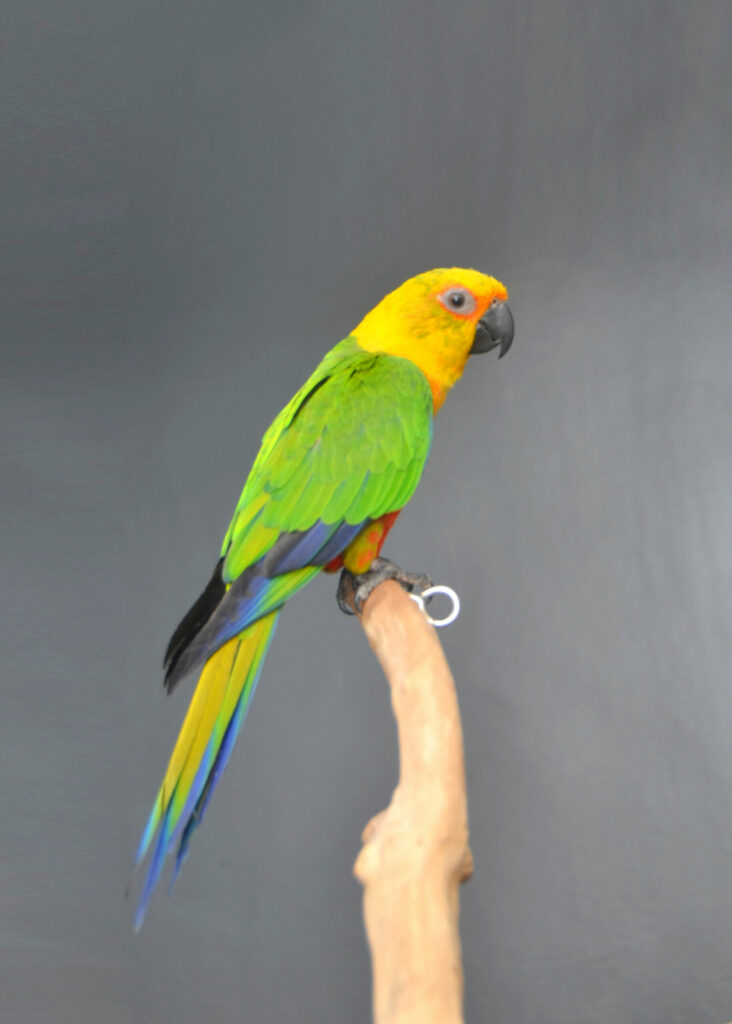
- Social nature and flock dynamics: Jenday Conures are highly social creatures that thrive in the company of their flock. In the wild, they form large groups comprising their extended family members, engaging in communal activities such as foraging and roosting. This social nature translates into their behavior as pets, as they enjoy interacting and bonding with their human caregivers.
- Vocalizations and sounds: With their expressive nature, Jenday Conures are vocal birds that use different calls and sounds to communicate with others. Their repertoire includes melodious chirps, squawks, and trills, which they use to express their emotions and convey messages.
- Playful and intelligent behavior: Jenday Conures are known for their spirited and playful nature. They thrive on mental stimulation and enjoy engaging in various activities, such as solving puzzles and learning tricks. Their high intelligence and curious nature make them excellent companions who never fail to entertain.
Housing and Enclosure Requirements for Jenday Conure
- Ideal cage size and setup: To provide a comfortable living space for this Bird Species, it’s essential to ensure they have a spacious cage. A minimum size of 24 inches by 24 inches by 36 inches is recommended, allowing them ample room to move, stretch their wings, and engage in natural behaviors.
- Perches, toys, and enrichment options: To create a stimulating environment, include a variety of perches with different thicknesses to promote foot health and exercise. Offer a wide range of toys, such as puzzle toys, rope perches, and chewable toys that support their natural behaviors and prevent boredom.
- Importance of a stimulating environment: Jenday Conures are highly intelligent and need mental stimulation to thrive. Providing a stimulating environment with toys, perches, and regular out-of-cage playtime allows them to explore, exercise, and engage in enriching activities that mimic their natural behaviors.
Diet and Feeding Habits 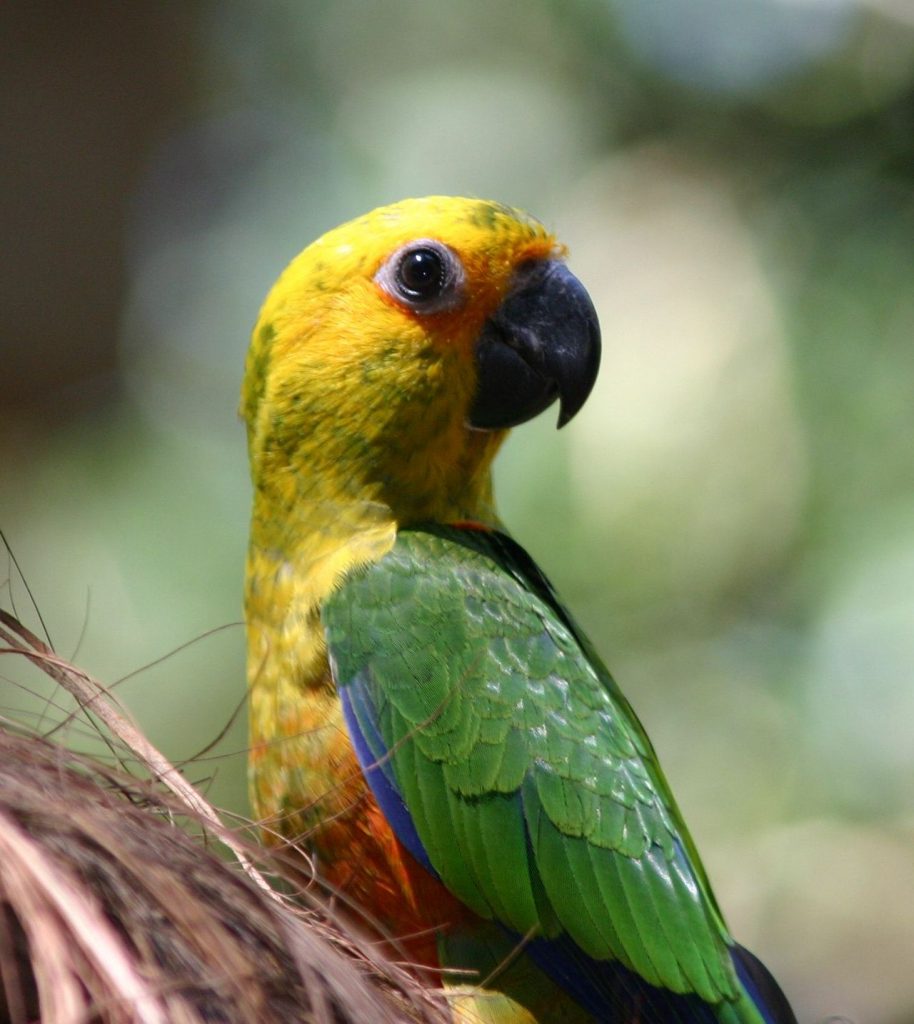
- Primary food sources in the wild: In their natural habitat, Jenday Conures feed on a diverse diet consisting of fruits, seeds, nuts, and various vegetation. They have a particular fondness for palm fruits, which are abundant in their native regions.
- Nutritional needs of Jenday Conures: To ensure their optimal health, it is crucial to offer a well-balanced diet to pet Jenday Conures. This includes a high-quality pellet mix as the foundation of their diet, supplemented with fresh fruits, vegetables, and occasional treats to provide a variety of essential nutrients.
- Balanced diet and recommended food options: A balanced diet for Jenday Conures should consist of 60-70% high-quality pellets, 20-30% fresh fruits and vegetables, and 5-10% occasional treats. Some recommended fruits and vegetables include apples, oranges, broccoli, and carrots. Care should be taken to avoid toxic foods such as avocados or chocolate.
Health Care and Maintenance
- Common health issues and concerns: Jenday Conures, like any pet bird, may be susceptible to certain health issues. These may include respiratory infections, feather plucking, beak and feather disease, or vitamin deficiencies. Regular veterinary check-ups and attentive observation of their behavior and physical condition are essential to maintain their well-being.
- Regular vet check-ups and preventive care: It is vital to establish a relationship with an avian veterinarian who can provide routine check-ups and preventive care for your Jenday Conure. Regular examinations, beak and nail trims, as well as vaccinations if recommended, are key components of keeping your feathered friend healthy.
- Providing a clean and safe living environment: Maintaining a clean habitat is crucial for the health of your Jenday Conure. Regularly clean their enclosure, perches, toys, and food and water containers to prevent the build-up of harmful bacteria. Ensure that their living space is safe, free from hazards, and well-ventilated.
Training and Socialization
- Basic training techniques: Training Jenday Conures can be both rewarding and enjoyable. Utilize positive reinforcement techniques, such as offering treats and praise, to encourage desired behaviors. With patience and consistency, they can learn tricks, commands, and even develop a limited vocabulary.
- Taming and building trust with your Jenday Conure: When bringing a Jenday Conure home, it is essential to allow them time to adjust to their new environment and establish trust. Gradually introduce them to handling and socialization, ensuring gentle and positive interactions to build a strong bond based on trust and mutual understanding.
- Socializing with other pets and humans: Jenday Conures thrive on social interactions and can develop close bonds with their human companions. Additionally, they can coexist harmoniously with other pets, such as cats or dogs, if introduced and supervised properly. Always ensure the safety and well-being of all animals involved.
Breeding and Reproduction
- Sexual maturity and breeding season: Jenday Conures typically reach sexual maturity between the ages of 2 to 3 years. The breeding season for these birds generally occurs during the spring and summer months, aligning with the availability of food and favorable breeding conditions.
- Nesting requirements and behavior: To encourage successful breeding, provide a nesting box made of wood or metal, with suitable dimensions and a comfortable lining of shredded paper or wood shavings. Jenday Conures exhibit nesting behavior by exploring and preparing the nesting site, with the female ultimately laying a clutch of 3 to 4 eggs.
- Caring for eggs and baby Jenday Conures: During the incubation period of approximately 23 days, it is crucial to ensure a stable temperature and humidity level within the nesting box. Once the chicks hatch, both parents play an active role in feeding and caring for the young, with fledging usually occurring around 8 to 10 weeks after hatching.
Legal Considerations and Conservation Status
- Legal restrictions on owning Jenday Conures: Before acquiring a this bird species as a pet, it is crucial to understand and comply with any legal restrictions regarding ownership, as these may vary depending on your location. Check local regulations, such as permits or licenses required, to ensure legality.
- Conservation efforts and protection status: Jenday Conures are considered a species of least concern in terms of conservation status. However, efforts to protect their natural habitats and raise awareness about responsible pet ownership in captivity continue to contribute to their long-term preservation.
Pros and Cons of Having a Jenday Conure as a Pet
- Advantages of owning a Jenday Conure: Owning a Jenday Conure can be a truly rewarding experience. Their vibrant colors, playful nature, and entertaining personality bring joy and excitement into any household. They provide companionship, love, and the opportunity to witness the wonders of nature up close.
- Potential challenges and responsibilities: While Jenday Conures are delightful pets, they also require dedicated care and attention. Their high intelligence and social nature demand mental stimulation and regular interactions. Additionally, proper nutrition, veterinary care, and a clean environment are vital aspects of responsible ownership.
Finding and Choosing a Jenday Conure
- Reputable breeders and adoption centers: When considering acquiring a Jenday Conure, it is essential to obtain one from a reputable breeder or adoption center. Ensure that they prioritize the well-being and proper care of their birds, promoting responsible breeding and ethical practices.
- Factors to consider when selecting a Jenday Conure: Before bringing a Jenday Conure home, consider factors such as the bird’s health, behavior, and temperament. Pay attention to their interaction with humans, as well as their overall physical condition, to ensure you choose a healthy and well-adjusted companion.
Bringing Your Jenday Conure Home
- Preparing your home for a new pet bird: Before your Jenday Conure arrives, make necessary preparations to create a safe and comfortable environment. Remove any potential hazards, such as toxic plants or household chemicals, and identify an ideal location for their cage that is away from drafts and direct sunlight.
- Introducing your Jenday Conure to its new environment: When introducing your Jenday Conure to its new home, provide a quiet and calm space for them to acclimate. Offer fresh food, water, and a selection of toys and perches to keep them engaged and entertained. Give them time to explore their surroundings gradually, allowing them to adjust at their own pace.
Providing the Perfect Care and Attention
- Daily care routine and activities: Establishing a daily care routine is vital to ensure the well-being of your Jenday Conure. This should include providing fresh food and water, cleaning their cage regularly, engaging in interactive playtime, and allowing sufficient rest and sleep periods.
- Bonding and spending quality time: Building a strong bond with your Jenday Conure requires regular and positive interactions. Engage in activities such as training sessions, gentle petting, and talking to your feathered friend. Time spent together will deepen your connection and strengthen the trust between you.
Troubleshooting Common Issues
- Understanding behavioral problems: Jenday Conures, like any pet, may occasionally exhibit behavioral issues. These can include excessive screaming, biting, or feather plucking. Understanding the root causes behind such behaviors and addressing them with patience, positive reinforcement, and potentially seeking professional advice can help resolve these challenges.
- Creating solutions for common challenges: Common challenges that may arise when caring for a Jenday Conure include dietary issues, territorial behavior, and adjusting to new environments. By providing a balanced diet, consistent training, and a nurturing environment, many of these challenges can be mitigated.
READ ALSO:
- Arripis Trutta: Australian Salmon Fish Breed – 3 Beautiful Species info, Pictures and facts
- The Kurilian Bobtail Cat Breed Information
- Blue Shark Fish – 4 Basic Body Characteristics, Spawning And Distribution
Frequently Asked Questions
What is Jenday Conure Lifespan?
Jenday Conures, known for their vibrant and stunning plumage, have an average lifespan of 20 to 30 years when provided with proper care and a suitable environment. However, it’s important to note that individual variations and factors such as diet, exercise, and overall health can influence their lifespan. By offering a balanced diet, regular veterinary check-ups, and a stimulating living environment, you can maximize the lifespan of your feathered friend.
Can Jenday Conures learn to talk?
Yes, Jenday Conures have the potential to learn a wide range of words and phrases. While they may not develop the extensive vocabulary of larger parrot species, their ability to mimic sounds and speech can be quite impressive. With patience, consistent training, and daily interaction, you may be delighted by the unique and entertaining vocalizations your Jenday Conure can pick up. Remember, just like humans, each bird has its own personality and learning abilities, so not all Jenday Conures will become proficient talkers.
Do Jenday Conures require a companion bird?
This Bird Species are highly social creatures and thrive in the company of their human caregivers. While they enjoy interacting with humans, it’s essential to provide them with ample socialization opportunities. Though bonding with your Jenday Conure through regular handling and playtime is crucial, they do not necessarily require another bird for companionship. However, some individuals may benefit from having a same-species companion, as it can help alleviate boredom and provide additional social stimulation. Before introducing another bird to the mix, it is important to consider the specific personalities and temperaments of both birds to ensure compatibility.
How much daily interaction do Jenday Conures need?
Jenday Conures crave daily interaction and mental stimulation. To foster their well-being, it is recommended to spend at least one to two hours each day engaging with your bird. This can include activities such as playing, training sessions, providing toys and puzzles, and simply spending quality time together. Remember, Jenday Conures are intelligent, active birds, and without adequate mental and physical stimulation, they may develop behavioral problems or become unhappy. Make sure to create a daily routine that incorporates time for socialization and play, allowing your Jenday Conure to lead a contented and fulfilled life.
Can Jenday Conures be kept in outdoor aviaries?
While Jenday Conures are native to the wild and naturally adapted to outdoor environments, keeping them in outdoor aviaries isn’t always ideal. Due to their smaller size compared to other large parrot species, This Bird Species may be more susceptible to temperature extremes, predators, and potential diseases present in the environment. It is generally recommended to provide a spacious and enriching indoor enclosure for your Jenday Conure. However, supervised outdoor time in a secure, enclosed and predator-proof aviary can be enjoyed, as long as the weather conditions are suitable and you are able to closely monitor their well-being.
In summary, Jenday Conures are captivating and intelligent birds that can bring a touch of the wild into your home. By understanding their lifespan, talking abilities, social needs, and environmental requirements, you can provide them with the care they deserve and foster a long-lasting, fulfilling relationship. Remember that every Jenday Conure is unique, so observing and respecting their individual preferences and personalities will further strengthen the bond between you and your feathered companion.

